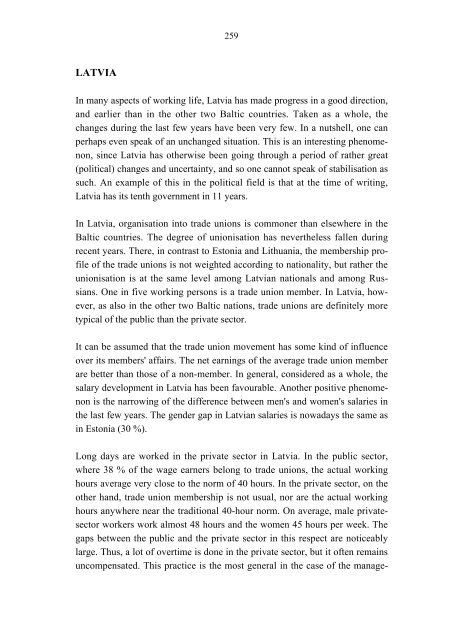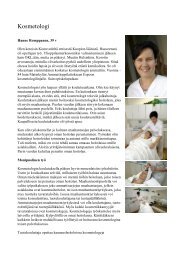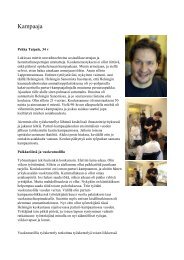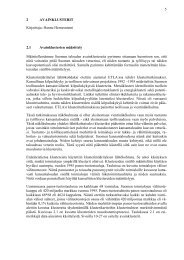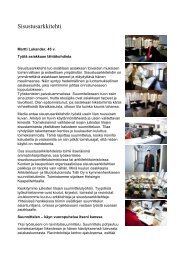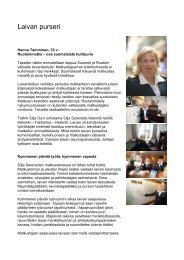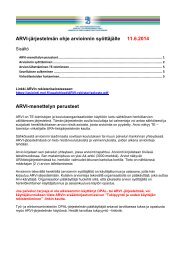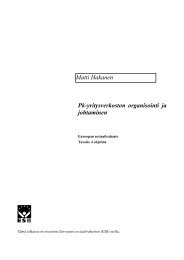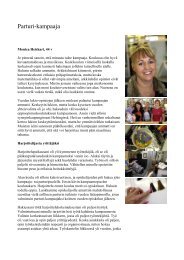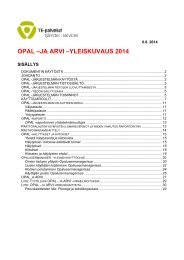Working Life Barometer in the Baltic Countries 2002 (pdf) - mol.fi
Working Life Barometer in the Baltic Countries 2002 (pdf) - mol.fi
Working Life Barometer in the Baltic Countries 2002 (pdf) - mol.fi
You also want an ePaper? Increase the reach of your titles
YUMPU automatically turns print PDFs into web optimized ePapers that Google loves.
LATVIA<br />
259<br />
In many aspects of work<strong>in</strong>g life, Latvia has made progress <strong>in</strong> a good direction,<br />
and earlier than <strong>in</strong> <strong>the</strong> o<strong>the</strong>r two <strong>Baltic</strong> countries. Taken as a whole, <strong>the</strong><br />
changes dur<strong>in</strong>g <strong>the</strong> last few years have been very few. In a nutshell, one can<br />
perhaps even speak of an unchanged situation. This is an <strong>in</strong>terest<strong>in</strong>g phenomenon,<br />
s<strong>in</strong>ce Latvia has o<strong>the</strong>rwise been go<strong>in</strong>g through a period of ra<strong>the</strong>r great<br />
(political) changes and uncerta<strong>in</strong>ty, and so one cannot speak of stabilisation as<br />
such. An example of this <strong>in</strong> <strong>the</strong> political <strong>fi</strong>eld is that at <strong>the</strong> time of writ<strong>in</strong>g,<br />
Latvia has its tenth government <strong>in</strong> 11 years.<br />
In Latvia, organisation <strong>in</strong>to trade unions is commoner than elsewhere <strong>in</strong> <strong>the</strong><br />
<strong>Baltic</strong> countries. The degree of unionisation has never<strong>the</strong>less fallen dur<strong>in</strong>g<br />
recent years. There, <strong>in</strong> contrast to Estonia and Lithuania, <strong>the</strong> membership pro<strong>fi</strong>le<br />
of <strong>the</strong> trade unions is not weighted accord<strong>in</strong>g to nationality, but ra<strong>the</strong>r <strong>the</strong><br />
unionisation is at <strong>the</strong> same level among Latvian nationals and among Russians.<br />
One <strong>in</strong> <strong>fi</strong>ve work<strong>in</strong>g persons is a trade union member. In Latvia, however,<br />
as also <strong>in</strong> <strong>the</strong> o<strong>the</strong>r two <strong>Baltic</strong> nations, trade unions are def<strong>in</strong>itely more<br />
typical of <strong>the</strong> public than <strong>the</strong> private sector.<br />
It can be assumed that <strong>the</strong> trade union movement has some k<strong>in</strong>d of <strong>in</strong>fluence<br />
over its members' affairs. The net earn<strong>in</strong>gs of <strong>the</strong> average trade union member<br />
are better than those of a non-member. In general, considered as a whole, <strong>the</strong><br />
salary development <strong>in</strong> Latvia has been favourable. Ano<strong>the</strong>r positive phenomenon<br />
is <strong>the</strong> narrow<strong>in</strong>g of <strong>the</strong> difference between men's and women's salaries <strong>in</strong><br />
<strong>the</strong> last few years. The gender gap <strong>in</strong> Latvian salaries is nowadays <strong>the</strong> same as<br />
<strong>in</strong> Estonia (30 %).<br />
Long days are worked <strong>in</strong> <strong>the</strong> private sector <strong>in</strong> Latvia. In <strong>the</strong> public sector,<br />
where 38 % of <strong>the</strong> wage earners belong to trade unions, <strong>the</strong> actual work<strong>in</strong>g<br />
hours average very close to <strong>the</strong> norm of 40 hours. In <strong>the</strong> private sector, on <strong>the</strong><br />
o<strong>the</strong>r hand, trade union membership is not usual, nor are <strong>the</strong> actual work<strong>in</strong>g<br />
hours anywhere near <strong>the</strong> traditional 40-hour norm. On average, male privatesector<br />
workers work almost 48 hours and <strong>the</strong> women 45 hours per week. The<br />
gaps between <strong>the</strong> public and <strong>the</strong> private sector <strong>in</strong> this respect are noticeably<br />
large. Thus, a lot of overtime is done <strong>in</strong> <strong>the</strong> private sector, but it often rema<strong>in</strong>s<br />
uncompensated. This practice is <strong>the</strong> most general <strong>in</strong> <strong>the</strong> case of <strong>the</strong> manage-


